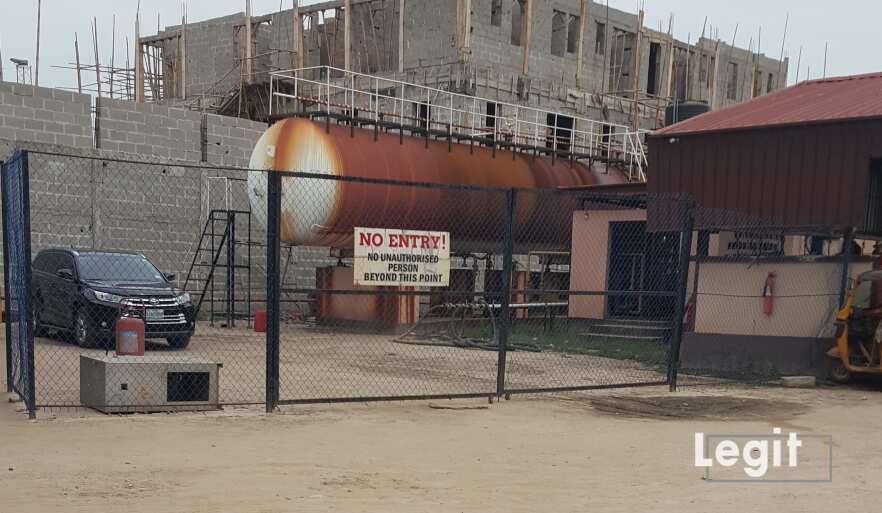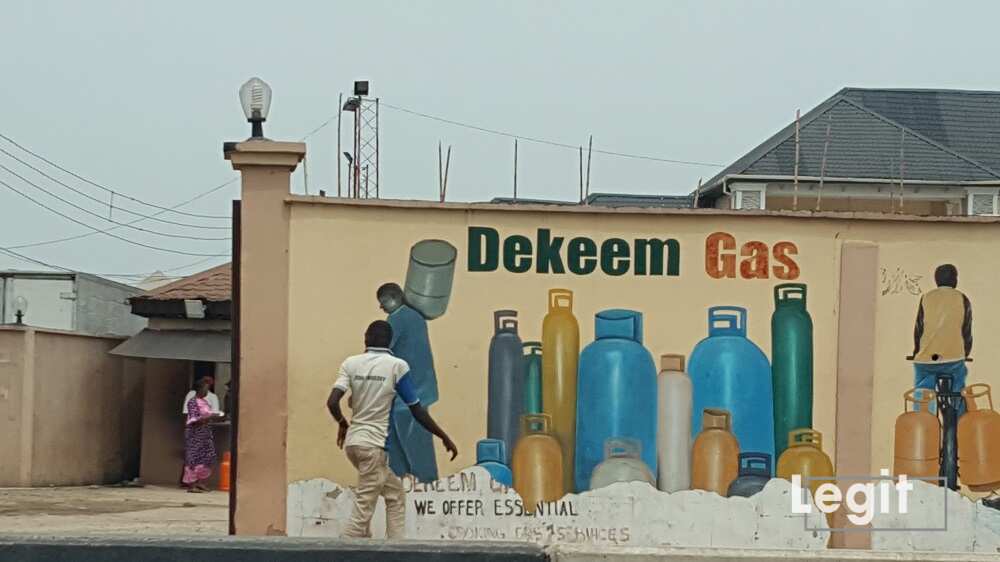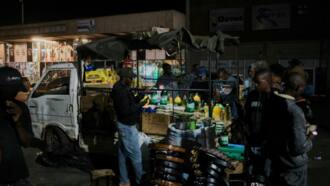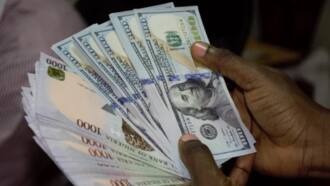Lagosians Threaten to Return to Charcoal, Firewood as Price of 12.5kg Cylinder Cooking Gas Rises to N12,000
- The cost price of refilling a 12.5kg cylinder of Liquefied Petroleum Gas (LPG), commonly known as cooking gas, has recently increased to about an average of N12,000 in some parts of Lagos
- Consumers are now lamenting the continuous increase in price, which is now pushing the product out of the reach of many
- The increase in the price of gas, along with the hike in food prices, automatically increases the cost of production for food business owners
Madam Tope Akindele, a housewife, arrived at her usual gas depot in the Okota area of Lagos to refill her 12.5kg gas cylinder but was however surprised when the gas depot attendant informed her that the measure she had only bought about a month ago at N10,200 had suddenly increased to 11, 800.
Angry and frustrated, she began to lament how the increase would affect the monthly budget money that her civil-servant husband handed out to her.
Given the pattern of increases in the price of almost everything, particularly food items, she cannot make up for the extra amount by taking from the money budgeted for other items.

Source: Original
With despair, she wonders if she may have to resort to cheaper alternatives such as charcoal and firewood.
PAY ATTENTION: Follow us on Instagram - get the most important news directly in your favourite app!
Price of gas: The bigger picture
The cost of refilling a 12.5kg Liquefied Petroleum Gas (LPG), commonly known as cooking gas, has recently increased to about an average of N12,000 in some parts of Lagos. The cost of refilling a 5kg cylinder also increased to N4,750 on average.
This is according to findings by our correspondent who visited several gas retailing depots in the state, speaking with both dealers and consumers of the product as they lament the exponential increase.

Read also
"Fuel subsidy is gone": Marketer explains hiked fuel prices after President Tinubu's speech
According to its Liquefied Petroleum Gas (Cooking Gas) Price Watch for August 2022, the National Bureau of Statistics (NBS) disclosed that the average retail price for refilling a 12.5kg cylinder of Cooking Gas increased by 0.77% on a month-on-month basis from N9,824.07 in July 2022 to N9,899.34 in August 2022.
For the 5kg cylinder, the average retail price for refilling increased from N4,397.68 recorded in July 2022 to N4,456.56 in August 2022.
In the same report, the NBS indicated that states like Ebonyi were already paying as much as N11,225.00 for refilling the 12.5kg cylinder in August 2022.
Today, consumers are experiencing the surge even as the Nigerian Liquefied Natural Gas Ltd (NLNG), through its Managing Director and CEO, Dr Philip Mshelbila, earlier in the year promised Nigerians the supply of 100% of the company’s LPG production.
The federal government had also assured Nigerians to take steps to bring down the cost of the highly in-demand product.
However, that is yet to manifest as consumers are now lamenting the continuous price increase, pushing the product out of the reach of many.
Consumers’ reaction to hike in price of cooking gas
Timothy Omigie, a businessman who was at Dekeem Gas depot in the Okota-Isolo area to purchase the product, told Legit.ng that the price hike has become frustrating to consumers.
“At this point, we are quite frustrated at the rate at which the price of every commodity in the market keeps surging every single day. Imagine the increase from last month to this month and with every possibility that it might increase again in the next few weeks,” he said.

Source: Original
Another Lagos housewife, Adetoun Omole who resides in Ikorodu, stated her frustration:
"I bought 12.5kg cylinder in this same depot last month for N10,000, only to be told today that it is now N12,200. This really destabilizes my budget. What if I didn’t come with extra money that would have meant that I go back home and not purchase gas and definitely would not be able to cook food at home.
“The government doesn’t seem to be doing anything about the constant increase in the price of cooking gas. They (the government) have been encouraging us to use gas instead of charcoal, but with the way things are going, the common man may no longer be within the reach of the common man."
Folake Obasa, a restaurant owner, said that the increase in the price of gas along with the hike in food prices, automatically increases the cost of production for her business.
"When I consider that I have to pay more for gas and food items I buy from the market, I cannot help but reduce the quantity or quality of the food or maybe increase the price for a portion if I need to still make a substantial profit," Obasa told Legit.ng.
Why the surge in the price of cooking gas?
A mini gas depot in the Ikeja area sold the product for N11,750 for the 12.5kg cylinder. The manager of the depot who chose to speak on the condition of anonymity, stated that the selling price at the depot is usually determined by how much they buy from the marketers.

Read also
"Too harsh": President Bola Tinubu speaks on use of old and new naira notes as Emefiele prepares to leave
“The increase is not really our fault. We also buy the product to sell to consumers. If there is an increase in price by the marketers, we also have to increase from our end to avoid losses. The problem is really from the top of the chain.”
Chima Nwankwo, a retailer in the Ajah area, said that one of the factors responsible for the high cost of cooking gas is the rising foreign exchange rate in the country.
“Asides from being a dealer, I’m also a gas consumer, so I understand how our customers are feeling. Gas is not the only thing that keeps increasing in price in Nigeria. A great percentage of locally consumed gas is being imported and you cannot rule out the factor of rising dollar and naira devaluation,” Nwankwo said.
Experts say supply not matching up with increase in demand
Recall Legit.ng earlier reported that the Nigerian government had disclosed that the value of the country’s gas deposits stands at about 206.53 trillion cubic feet, estimated at $803.4trn which is the highest in Africa.

Read also
"Subsidy is gone": Fuel queues return on Tinubu’s first working day as Nigeria's president, NNPC speaks
Exclusively speaking in an interview with Legit.ng, Akin Taiwo, an Energy consultant with a Lagos-based oil and gas company, stated that the trend of switching to cleaner energy from local alternatives in the last one decade highlights the interplay of the forces of demand and supply in the increase in the price of cooking gas.
Taiwo said:
“More than a decade ago, the demand was just about 60,000 metric tonne per year as cooking gas was largely unpopular compared to kerosene. Today, we consume over 1 million metric tonnes per year.
“To meet up with the demand, we have to import. It is at this point that importers have to deal with the bottlenecks of a scarcity of dollars, government's recent introduction of 7.5% value-added tax (VAT) and others.”
The Russian aggression on Ukraine comes with the shortage of supply of gas demands around the world, says Abiola Odutola, an energy expert.
"Russia is the world's largest natural gas exporter. Due to the imposition of an embargo on its gas, countries like Nigeria that depend on the eastern European country for imports will feel the brunt," Odutola said.
All efforts to get the NLNG to speak on the matter were unsuccessful, as emails, text messages and phone calls were not responded to at the time of publishing the article.
Many consumers considering alternatives
Despite the frequent promises of moves to produce sufficient LPG to meet local demand, Nigeria cannot deepen the product's spread and utilisation.
Even though it is unarguably a safer and more environmentally friendly fuel for cooking, the steep increase in the price of gas seems to be driving consumers away, thereby forcing many to move to other alternatives like charcoal and firewood which harms the environment.
Jumai Ahmed, a provision store trader, said that the current reality is making her consider other alternatives.

Read also
Former General Manager of Nigeria LNG, Godwill Dike slammed with N1.6 billion defamation lawsuit.
“If I spend half the cooking gas price on charcoal or even firewood, that could serve me for a longer period. Even though I may want to consider the environmental impact of these alternatives, I must also consider the economic impact of paying higher for gas,” she said.
Weighing in, Uduak Peters, a single-lady resident in Agege, said she gave up on the use of gas since July when she purchased a coal stove for use. She said:
"Because of my tight work schedule, I don’t cook much, unless at weekends. For someone who doesn’t cook much, it is a lot cheaper for me to use the modern coal stove compared to gas.”
George Atoh, a resident in Surulere, while speaking with Legit.ng said that with Nigeria’s large deposits of LPG, Nigerians should normally not have a problem with access to gas.
“They keep saying Nigeria has an abundance of oil and gas deposits, but one keeps wondering why the spikes in prices,” Atoh said. “The good thing is that the hike concerns both the rich and the poor as both classes now use the product, unlike the days when the hike in the price of kerosene was of no concern to the rich.”
The need for solutions to hike in cooking gas price
The price of cooking gas has more than doubled in the last one year without corresponding increases in local supply, thereby contributing to the rise in the cost of living and declining purchasing power of the average Nigerian
This is not the first time Nigerians have threatened to return to a more traditional method of cooking. In 2016, Nigerians turned to the use of charcoal for their household cooking due to an acute kerosene scarcity in the country.
Over the years, Nigerians have settled with the use of gas as a reliable means of cooking as a result of its speed and low health risk to the users. However, a persistent increase in the cost of cooking gas is now threatening to force average Nigerians into the use of traditional biomass such as charcoal and firewood, a situation which could have significant impacts on their health as it exposes them to smoke.
Source: Legit.ng





